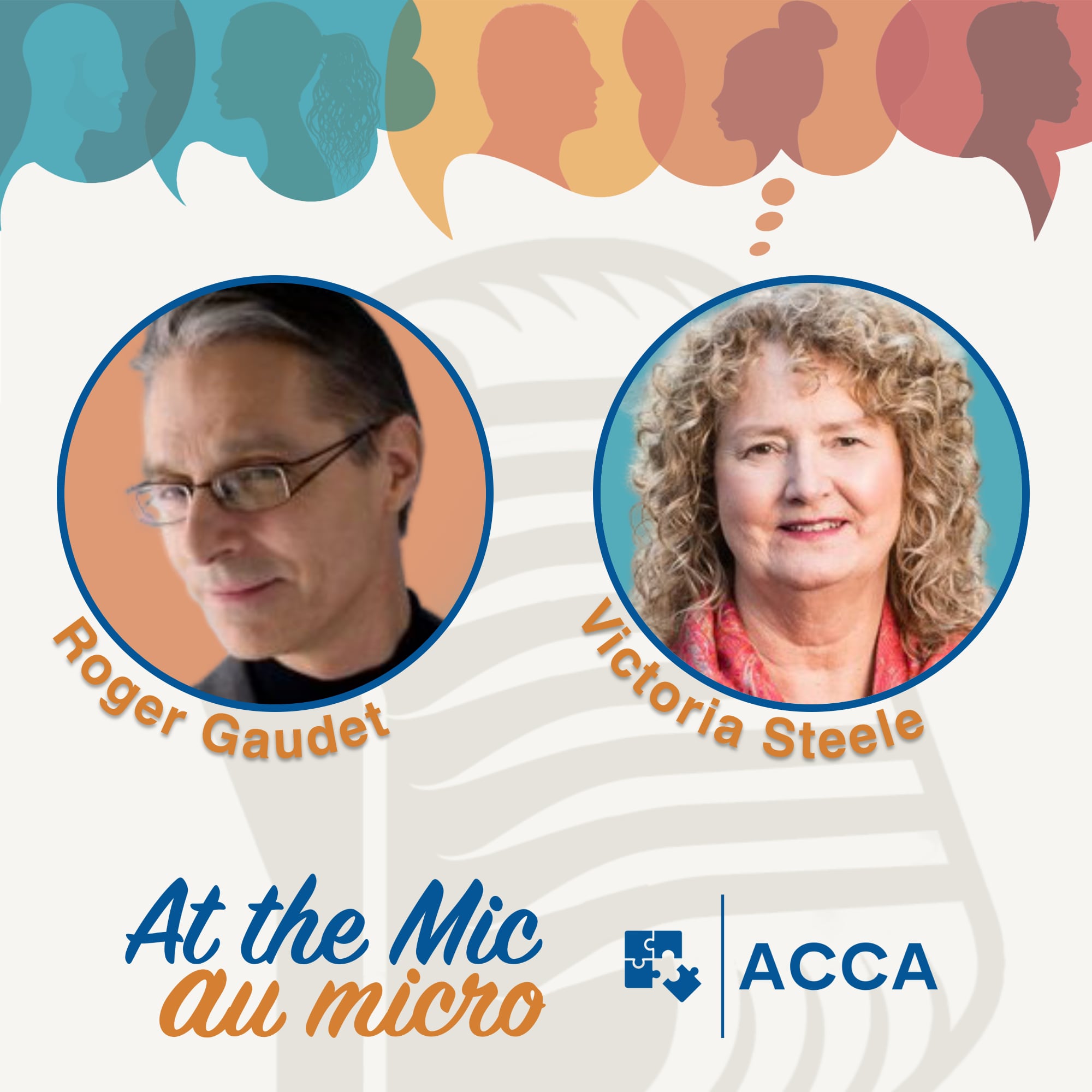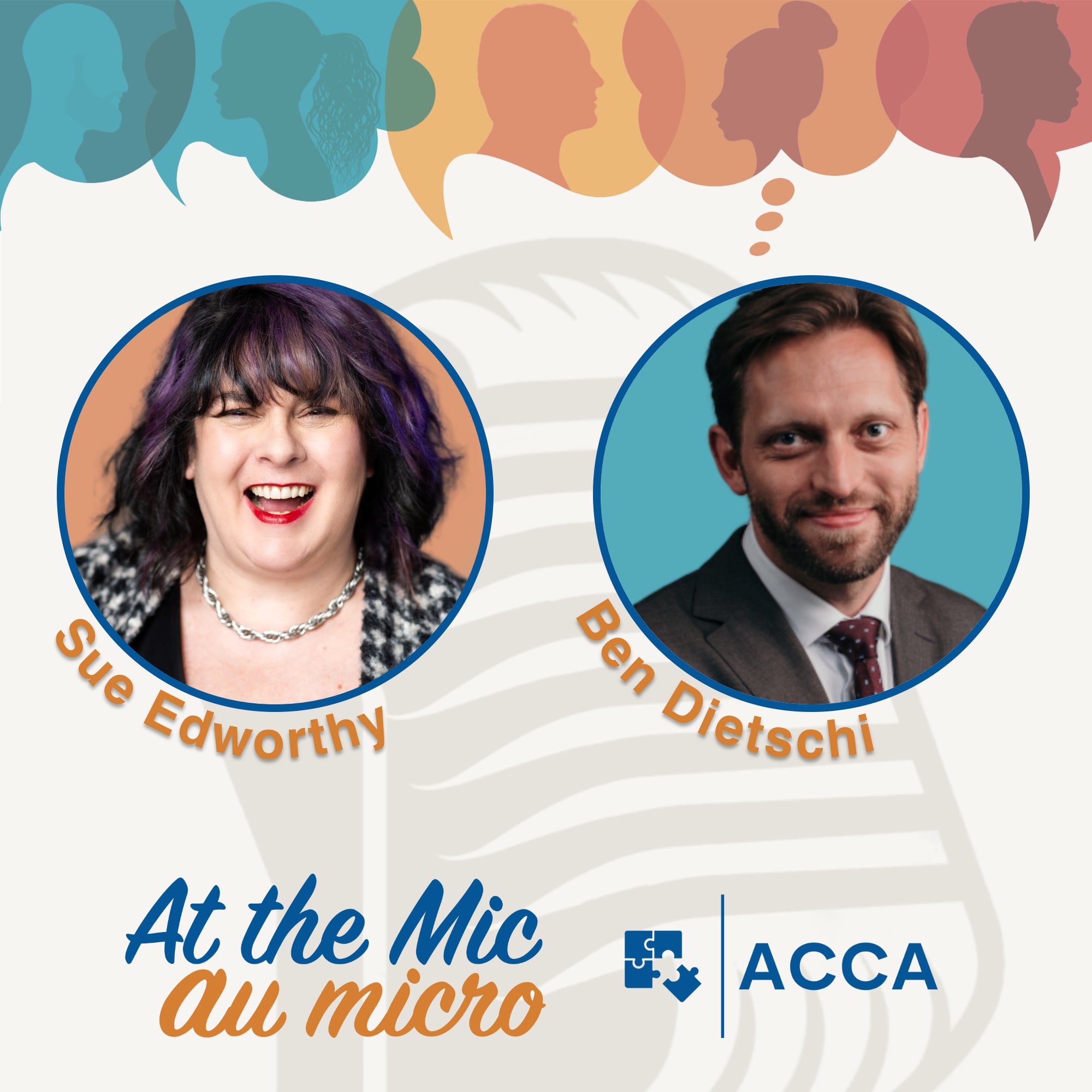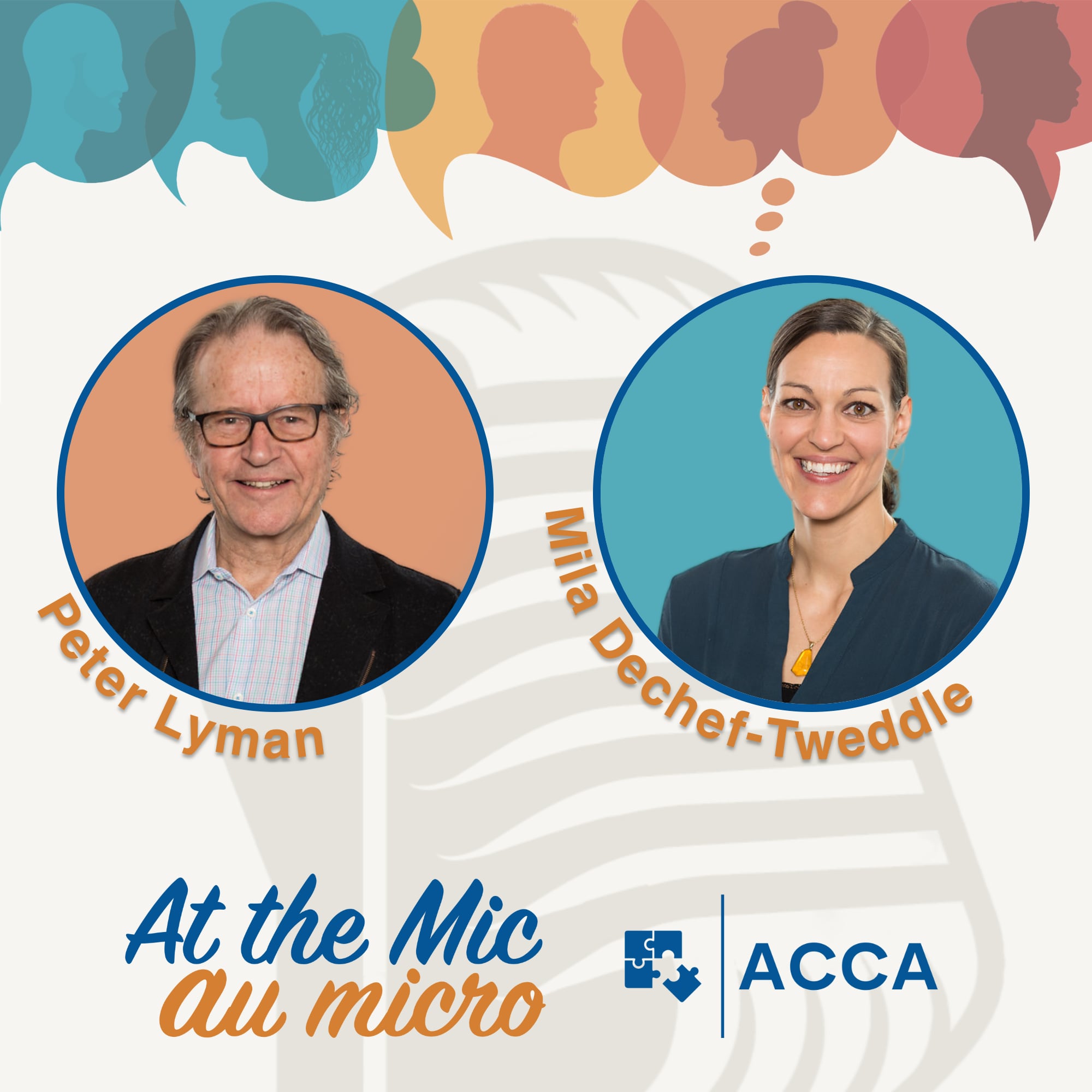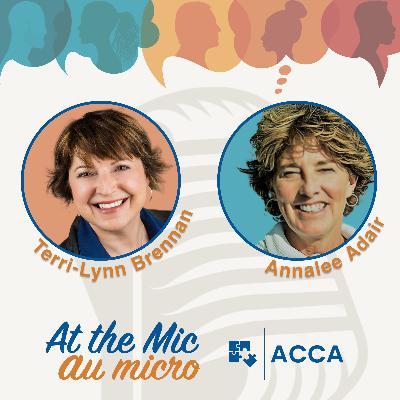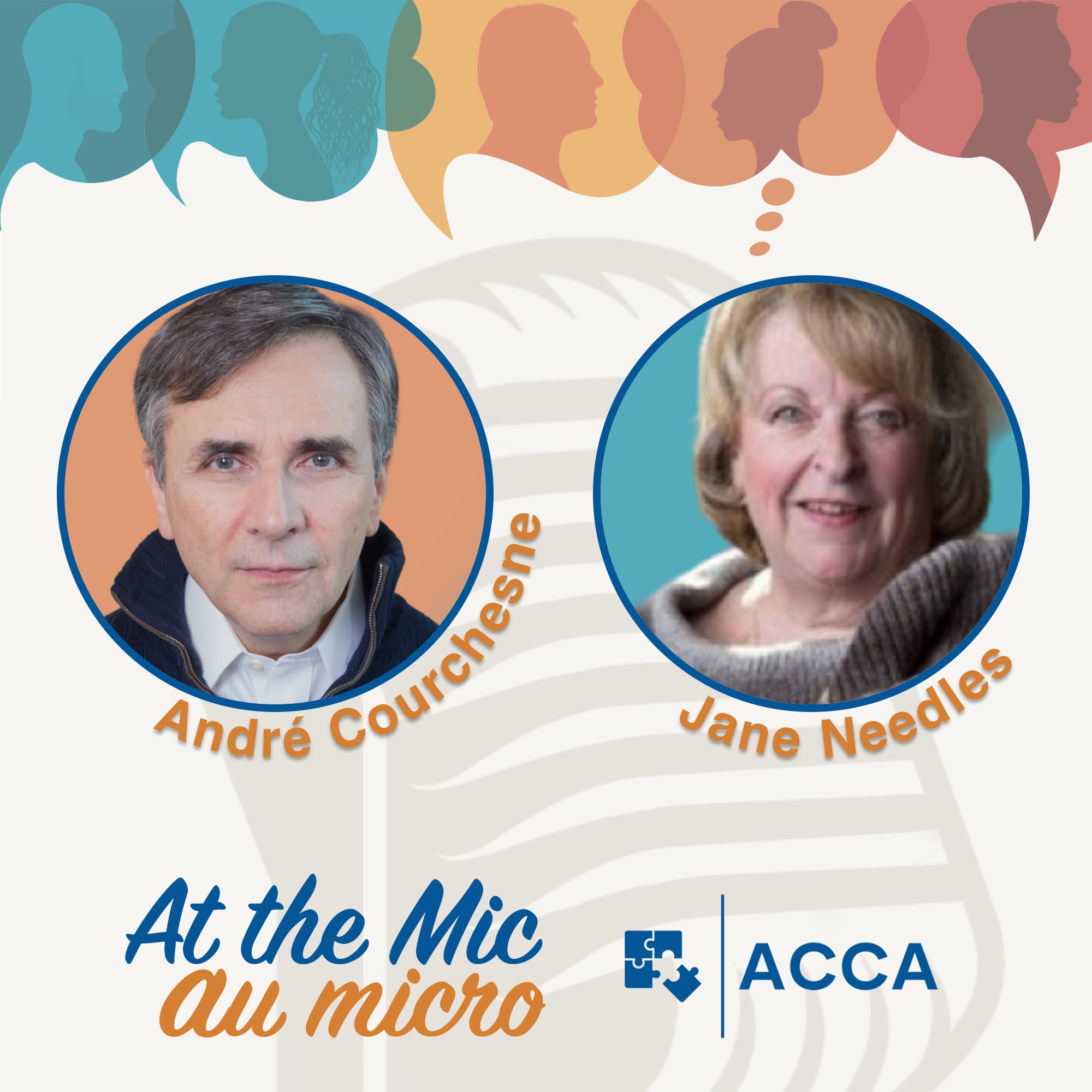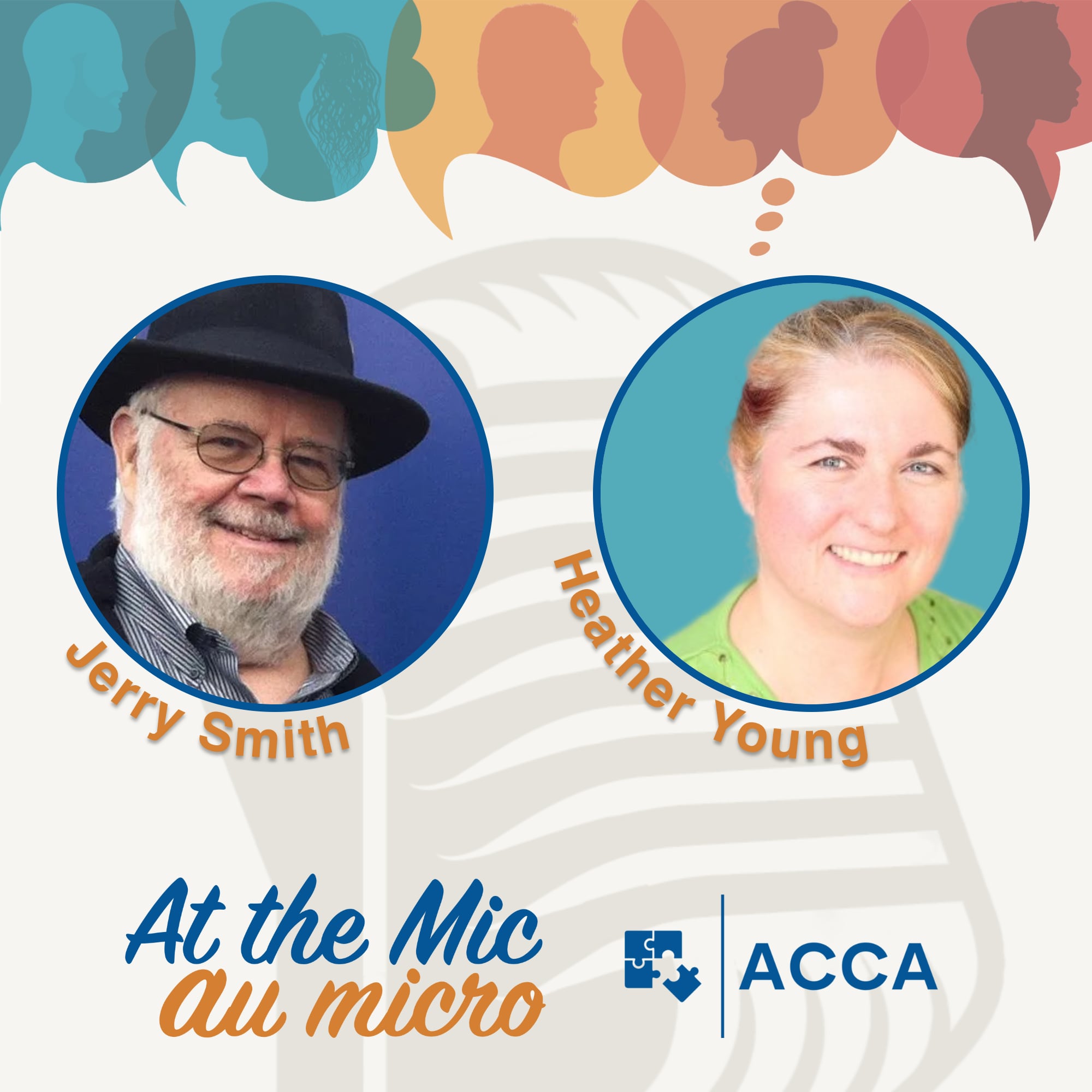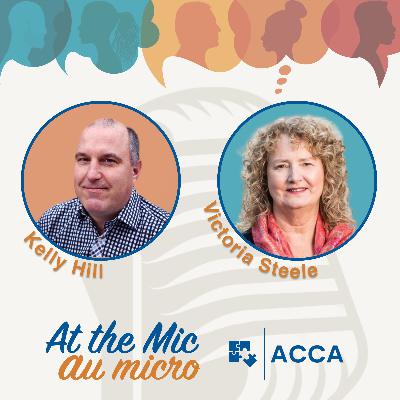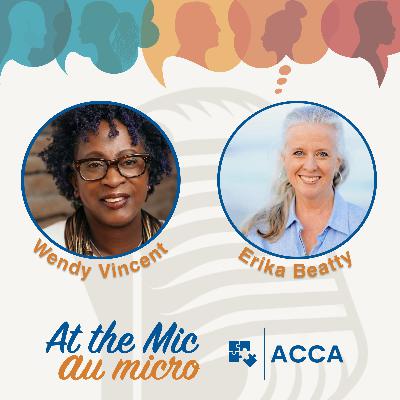Discover At The Mic / Au micro
At The Mic / Au micro

At The Mic / Au micro
Author: Arts Consultants Canada
Subscribed: 0Played: 0Subscribe
Share
© 2022-2024
Description
Welcome to At The Mic, a podcast brought to you by Arts Consultants Canada, association des Consultants canadiens en arts. ACCA is Canada’s national association of professional consultants dedicated to supporting a vibrant and sustainable arts and culture scene.
Nous vous souhaitons la bienvenue au balado Au Micro ACCA. Quelques épisodes seront en français et nous vous offrirons un service de traduction des transcriptions afin de ne rien manquer!
At The Mic/ Au micro covers contemporary issues and ideas about our current arts and culture ecology. In every episode we will feature an ACCA member who specializes in one of those issues in conversation with a guest moderator. Featured topics will include everything from leadership coaching to governance, new business models and equity in the arts. There will be a new episode of 30 minutes or so over each of the next ten months and we encourage you to check out those of value to you and your organization. We are here to give you a hand as we all navigate the changing world in which you operate.
ACCA acknowledges the support of the Canada Council for the Arts for this podcast series. / L’ACCA remercie le Conseil des Arts du Canada pour son soutien à cette série de balados.
Nous vous souhaitons la bienvenue au balado Au Micro ACCA. Quelques épisodes seront en français et nous vous offrirons un service de traduction des transcriptions afin de ne rien manquer!
At The Mic/ Au micro covers contemporary issues and ideas about our current arts and culture ecology. In every episode we will feature an ACCA member who specializes in one of those issues in conversation with a guest moderator. Featured topics will include everything from leadership coaching to governance, new business models and equity in the arts. There will be a new episode of 30 minutes or so over each of the next ten months and we encourage you to check out those of value to you and your organization. We are here to give you a hand as we all navigate the changing world in which you operate.
ACCA acknowledges the support of the Canada Council for the Arts for this podcast series. / L’ACCA remercie le Conseil des Arts du Canada pour son soutien à cette série de balados.
12 Episodes
Reverse
Hosted by Victoria Steele with invited guest expert, Roger Gaudet: Arts organizations have always sought out partnerships to help them develop - to increase their dissemination and production opportunities, to reach new audiences or to share services and infrastructure. Your organization may be thinking of entering a partnership with a group in another sector - or considering a long-term collaboration with an organization that is quite different in structure or mandate. Roger Gaudet and Victoria Steele discuss a simple exercise that partners can do to get to know each other better, improve communication and smooth the way forward in partnering activities.
Animé par Victoria Steele avec l'expert invité Roger Gaudet: Les organismes artistiques ont toujours recherché des partenariats pour les aider à se développer - pour accroître leur diffusion, augmenter leurs opportunités de production, rejoindre de nouveaux publics ou partager des services et des infrastructures. Votre organisation envisage peut-être de conclure un partenariat avec une autre organisation dans un autre secteur - ou envisage une collaboration à long terme avec une organisation dont la structure ou le mandat est très différent. Victoria Steele et Roger Gaudet discutent d’un exercice simple que les partenaires peuvent faire pour mieux se connaître et faciliter la progression des activités de partenariat.
As we approach the end of 2023, how has the arts and culture industry adapted since the pandemic - or has it? Considering the current state of inflation and economic instability, what unique revenue generation challenges are arts organizations facing now? Tune in for a discussion with Sue Edworthy and Ben Dietschi as they talk about virtual events and online platforms, collaboration with other sectors, the preferences of younger audiences, and the ever-evolving financial and artistic landscape all without ever using the word pivot.
Ben Dietschi:
Ben Dietschi is a Senior Consultant with the DeVos Institute of Arts Management, supporting a diverse array of organizations to achieve short and long-term goals in the areas of strategic planning, artistic planning, marketing, fundraising, change management, and community engagement.
Since joining the Institute, Ben has led or assisted 50+ strategic planning processes, conducted regional arts ecology studies, and served as advisor to 30+ organizations. Recent clients include The Yale Schwarzman Center (New Haven), The Wexner Center for the Arts (Columbus), Step Afrika! (Washington, DC), Philharmonia Baroque (San Francisco), The Museo de Arte de Puerto Rico, The Ellis Marsalis Center for Music (New Orleans), and Kentucky Shakespeare (Louisville).
Prior to joining the Institute, Ben was executive director of Soundstreams, Canada’s leading contemporary music and opera producer. During his tenure, the organization expanded revenues by 67% to support more staged opera and immersive performances, launched an ambitious international touring program, and transformed its brand to reach new audiences. He spearheaded the launch of a guest curator program designed to address the fragmented talent pipeline for music curators in Canada and contribute to the organization’s artistic succession plan.
Ben has served on the boards of several cultural institutions, frequently speaks at industry forums and conferences, and has served on numerous award and grant assessment panels. He received a distinguished alumni award from Brandon University and completed the DeVos Institute Global Arts Management Fellowship from 2017–2019.
Fundamentally, his arts management ethos rests on formative years as a saxophonist and composer, performing and recording across North America and Europe, experiencing the transformative power of the arts firsthand.
Sue Edworthy:
Sue Edworthy has worked in the non-profit performing arts for over twenty years, with stints as a director, event coordinator and arts administrator. She is now in demand as a consultant, speaker, and facilitator. She has run 75+ workshops on marketing, social media and branding, including the inaugural Work in Culture Marketing Masterclass in 2021/22. In addition, her company Sue Edworthy Arts Planning provides counsel, solutions and support for individual artists and arts organizations in areas such as marketing, branding, strategic planning, mentorship and facilitation.
Sue is a former Board Member for TAPA, was co-chair for Artsvote 2014, 2016 and 2018 and spent two years of a seven-year stint as Vice President of The Toronto Fringe Festival. She is a Harold Award recipient, received the 2012 and 2013 Char-PR Prize for PR, and was the 2015 recipient of the Leonard McHardy and John Harvey Award for Excellence in Arts Administration. Most recently she hasaccepted the Marketing position for Arts Consultants Canada.
How are municipalities and other regional governments approaching culture planning and strategy? What trends are taking hold in how municipal and regional planners are approaching culture planning and culture service delivery? How have municipal cultural planning goals shifted?
In this episode of At The Mic, Peter Lyman and Mila Dechef-Tweddle from Nordicity discuss their observations of how culture planning has evolved over the past decade and what approaches their team use to ensure a successful, community-engaged planning process.
Peter Lyman is Senior Partner of Nordicity, which he co-founded in 1979. He guided Nordicity’s merger with PricewaterhouseCoopers in 1998 and was made national lead partner for the Information Communications and Entertainment/Media practice. He then led Nordicity’s re-emergence as a standalone firm in 2002. Over the decades, he has found new ways to drive the business and help companies, arts and heritage institutions, industry associations and government agencies transform themselves to the digital world.
Peter is a media commenter and frequent panelist or moderator at professional conferences. He is active in the arts and social justice community, as past chair of the board for the Inspirit Foundation, governance chair of Canadian Stage in Toronto, and currently a board member for Caribbean Tales Media. He is an adjunct professor at Schulich Business School at York University, where he teaches cultural policy to the MBA students in arts and media. He is fluently bilingual in English and French.
Mila Dechef-Tweddle is a Director based in Nordicity’s Toronto office. She is a skilled consultant and accomplished leader who works closely with clients and stakeholders to proactively respond to key issues and opportunities.
Building from her background in museums and heritage, Mila works primarily with clients in the arts, culture and heritage sectors. Her work ranges from policy analysis, evaluation, and development, to economic and social impact assessment, to strategy development at the organizational and sector level.
Fluently bilingual in French and English, Mila has a proven track record of developing and implementing multifaceted methodologies and leading effective stakeholder and community engagement in both languages to inform the development of meaningful and actionable recommendations for her clients.
ACCA:
artsconsultants.ca
LinkedIn
Twitter
At The Mic / Au micro
How do consultants work effectively with diverse and marginalized communities, especially those who may challenge consulting norms? How do they build meaningful relationships in order for authentic community voices and data to be gathered?
In this episode of At The Mic, consultants and ACCA members, Dr. Terri-Lynn Brennan and Annalee Adair discuss their approach to working with equity deserving groups and Indigenous communities. They emphasize the importance of trust, relationship building, and challenging norms in their work. They share their experiences in challenging systems and measuring change, particularly in engaging with diverse communities and giving voice to marginalized groups. They highlight the concept of story reporting, where they collect and present qualitative data that honours the authenticity of voices in the community.
Link to slides discussed in this episode:
ACCA:
artsconsultants.ca
LinkedIn
Twitter
At The Mic / Au micro
How do consultants and architects approach working with communities, arts organizations, and city builders to successfully develop or redevelop new cultural spaces? What are the true foundations of arts infrastructure and what’s next in the future of cultural planning?
In this edition of AT THE MIC, we bring you a conversation about some essential contemporary approaches to imagining and reimagining cultural spaces. Our guest Sabrina Richard and moderator Christina Bagatavicius will share some of their wisdom gleaned from twenty years of experience. They are the co-founders of the Bespoke Collective, a forward-looking creative consultancy that is committed to redefining how culture and civic life bring people together.
ACCA acknowledges the support of the Canada Council for the Arts for this podcast series. / Nous remercions le Conseil des Arts du Canada pour son soutien à cette série de balados.
Sabrina Richard is the Director of Research and Planning at Bespoke Collective. An architect by training and a cultural planner by profession, Sabrina has led numerous large scale and complex architectural and cultural planning projects across Canada and internationally spanning needs assessments, feasibility studies, strategic planning, and community engagement. She is dedicated to the realization of thoughtful, dynamic, and meaningful cultural spaces enriched by innovative design, public engagement, community activation and inclusive consultation.
Sabrina is also a published author, designer and strategist focused on building a more equitable, inclusive, and resilient arts and culture ecosystem. Some of her recent projects include support for Indigenous Fashion Arts (IFA), the New Orleans Triennial of Art (Prospect), the Public Art Strategy for the Downsview Lands Development.
As the Principal of Bespoke, Christina Bagatavicius believes in forward-looking cultural programming, uplifting public engagement processes, and communications that captures the hearts and minds of a wider public. She collaborates with inspiring and creative clients who are committed to making lasting positive change.
Christina brings over fifteen years of international experience working with renowned culture and city building projects. Prior to launching Bespoke, she was the Curator and Head of Interpretation at the Tate in London, where she shaped the visitor experience for a world-leading art museum. During her time as a Project Director at Bruce Mau Design, she worked with a global roster of creative clients, from the Oprah Winfrey Network to the Liverpool Biennial.
Does working as an arts consultant with clients in a rural location differ in approach from working with clients in an urban setting? It can, yes. Rural and remote communities hold distinctive nuances that overlay a way of life to which arts sector development is not immune. Knowing what these nuances are and understanding how to both embrace and navigate them offers a path for stronger, webbed, resilient arts communities!
Cate Proctor (LinkedIn)
Having lived on an island on Canada’s east coast and having established Proctor Shift Consulting while there, Cate Proctor’s arts sector consultancy bridges multiple geographies. Grounded in senior arts administration and creative industry roles, her clientele ranges from rural artist collectives, festivals and municipalities to national and international projects involving multiple partners of diverse sector and artistic origins. Cate leans into arts sector development projects that centre artists within strategic and multi-sector partnerships while cultivating collaborative and trust-based relationships.
Cate is the author of Leverage the Arts Ecosystem to Influence Local Prosperity. Published in September 2020, her book offers artists, arts administrators and civic- or community-minded leaders, both strategies and tactics to centre artistic value in programming and community-building development. The book has generated much interest from across Canada, the United States and Britain and ranked #17 in Amazon Books ‘Art and Business’ category (2022).
Cate is both founding Co-Chair and member of Mass Culture’s Research Working Group and an active member of Arts Consultants Canada. Her current focus at PAL Ottawa engages an expansive team piloting a new, innovative, affordable live/work option for senior artists and arts workers.
Bridget MacIntosh
LinkedIn
Twitter: @bridgetannmac
Instage: @bridgetannmac
An award-winning strategist and creative producer, Bridget has held senior municipal management positions with portfolios spanning arts, cultural policy, public art and festivals.
A trusted arts leader, she continues to work with municipalities, and organizations across Canada and internationally – engaging, questioning, facilitating, and designing to build resilient communities, networks and organizational models. Her consultancy practice is particularly focused on exploring the power of intersectoral collaboration and leveraging opportunities for cultural expression to be championed and meaningfully integrated into everyday life and protected through public policy.
Bridget is the founding Co-Chair of Mass Culture’s Research Working Group, a Toronto Arts Council Cultural Leadership Lab Fellow, a Next City Vanguard and an IETM Global Connector.
ACCA links:
artsconsultants.ca
LinkedIn
Twitter
At The Mic podcast
Tune in to Andre Courchesne, Chair of the Carmelle et Remi-Marcoux program in Management of Cultural organizations at the École des Hautes Études Commerciales de Montréal, as he discusses the trends and needs of teaching Arts Management in the current realities of today’s world as we start to deal with the long recovery from the pandemic and how it has affected the arts as a whole. Joined by Jane Needles, also a long-time educator in Arts Administration, the conversation delves into what problems are faced and how they can be addressed and some new ideas.
L’enseignement de la gestion des organismes culturelles aujourd’hui
Écoutez André Courchesne, président du programme Carmelle et Remi-Marcoux en gestion des organismes culturels à l'École des Hautes Études Commerciales de Montréal, alors qu'il discute des tendances et des besoins de l'enseignement de la gestion des arts dans les réalités actuelles du monde, alors que nous commençons à faire face au long rétablissement de la pandémie et à la façon dont elle a affecté les arts dans leur ensemble. Rejoint par Jane Needles, également enseignante de longue date en gestion des arts, la conversation se penche sur les problèmes rencontrés et sur la manière de les résoudre, ainsi que sur certaines nouvelles idées.
Over the multi-year stretch of COVID-19, the global pandemic has shaken, threatened, and challenged how the arts, culture and heritage sector operates, and how it sees risk management as an essential tool for optimizing our contribution, our impact. Consultants have been essential to supporting – often leading – the learning curve the sector has experienced.
Active as trainer, consultant, educator and leader, Jerry Smith established the professional theatre training program at Humber College, and their post-diploma certificate program in Arts Administration. His experience includes a wide range of leadership roles on arts and culture boards in the Greater Toronto Area for which he was recognized as Volunteer of the Year and Cultural Champion.
Currently, Jerry serves as a member of the ArtsVote Toronto and ArtsDay at City Hall campaigns, a member of the peer assessment panels for the ArtsVest Program, and the Imagine Canada accreditation program. As a freelance consultant, Jerry has carried out program reviews and strategic plans for MCC, OAC, the Living Arts Centre, Orchestras Canada, Lakeshore Arts, Clay and Paper Theatre, Urban Arts, Neilson Park Creative Centre and HCA Dance Theatre.
Heather Clara Young has worked in arts management for over thirty years. Her experience includes leadership roles with Ontario arts and heritage service organizations, theatre and dance producing companies, facilities, festivals, and community organizations. Her firm Young Associates, founded in 1993, provides full-service bookkeeping and payroll as well as consulting services to not-for-profits and charities, primarily in the arts and culture sector. Heather also teaches in Humber College’s Arts Management program and has taught for the University of Toronto’s Arts Management program. She was the 2012 recipient of the Sandra Tulloch Award for Innovation in Arts and Culture, and a 2004 recipient of Humber College’s Continuing Education Award for Outstanding Academic Contribution. Her unique self-study guide, Finance for the Arts in Canada, will have its second edition published in 2023 and is a invaluable reference source for cultural organizations.
Recommended Resources:
A selection of effective worksheets to support the process of developing a working plan for Risk Management
Risk Management Toolkit, produced by CREATIVE NX, the Arts Council of New Zealand
Essential Governance Practices For Arts Organisations
Case in Point | What is Resilience anyway? | The Audience Agency
ASOs – Arts Service Organizations at the national (NASO), provincial (PASO), and municipal LASOs) serve as a gateway - Mapping Arts-Service Organizations in Canada (massculture.ca)
ACCA links:
artsconsultants.ca
LinkedIn
Twitter
At The Mic podcast
Being on top of the rapidly evolving state of the arts sector, locally and nationally, is vital to government agency policy setting and decision making. It is also essential for the advocates of Canada’s arts community to advance change. So, how do we stay on top of this? We get current good quality research that focuses on the arts and culture sector. Join Kelly Hill and Victoria Steele as they discuss the vital link played by solid arts research and how it can be of use.
Based in Hamilton, Kelly Hill has provided research insights into the Canadian arts community for 25 years. His company, Hill Strategies Research, is probably best known for its statistical work. However, Kelly also conducts qualitative research, such as a recent story project on resilience within the cultural sector during the pandemic.
Kelly has a unique perspective on the arts thanks to the over 400 research projects that he has undertaken. With a thorough knowledge of arts information sources, Kelly has produced many benchmark studies of the arts sector. He has a strong interest in projects that illuminate the well-being of artists and arts organizations.
His statistically-focused newsletter, available at statsinsights.ca, provides data and insights into artists and arts workers, public engagement, impacts of the arts, and current challenges with an eye to important issues such as accessibility, decolonization, equity, diversity, inclusion, and sustainability.
Victoria Steele is a bilingual management consultant based in Ottawa with 40 years’ experience in arts presenting, community engagement and advocacy. She is passionate about the power of the arts to connect communities and works with clients and stakeholders to develop strategies, realize innovative projects, and mentor careers. She has worked with arts organizations and festivals across Canada - mainstream, independent, indigenous, culturally diverse and francophone.
Victoria is best known as a former Managing Director of Theatre at the National Arts Centre for 19 years and general manager of Ontario theatre companies. With a passion for new work, she partnered with artistic directors to program over 50 world premieres. She served as Executive Director of Arts Network Ottawa and chaired the Ottawa Cultural Alliance as it developed the 2019–2022 Ottawa Cultural Roadmap. Victoria also currently teaches cultural management at UNB and is the Chair of Arts Consultants Canada and Treasurer of Cultural Human Resources Council.
Kelly Hill:
Hill Strategies Research Inc
LinkedIn
Facebook
Twitter
Victoria Steele:
LinkedIn
Twitter
ACCA links:
artsconsultants.ca
LinkedIn
Twitter
At The Mic podcast
The field of coaching has recently exploded as has an expectation that everyone should be able to coach as part of their role as consultant, supervisor or colleague. But what is coaching exactly? Join Jewell Goodwyn and Lucy White as they explore what coaching is and is not, how coaching, mentoring, and consulting differ and how coaching skills can be useful tools to bring to your consulting practice.
Lucy White is a certified coach and cultural executive with over thirty years’ experience.
She crashed her first ACCA members-only meeting in about 2013 when still employed full-time as executive director of the Professional Association of Canadian Theatres.
As a Principal with The Osborne Group, Lucy serves as interim executive director for non-profit organizations. Recent cultural sector clients include: Koffler Centre of the Arts, Norm Foster Theatre Festival, Gardiner Museum, Thunder Bay Symphony Orchestra, and Orchestras Canada.
Lucy’s long-time interest in personal and professional development in the non-profit sector led her study mindfulness practices, co-active coaching, and to become a Certified Positive Intelligence Coach. Lucy offers Mental Fitness for Nonprofit Leaders as well as individual coaching.
Lucy is an active volunteer and has served many boards including Mindfulness Everyday, Friends of the Osborne Collection of Early Children’s Books, CHRC and ACCA. She is a founder of the Canadian Arts Coalition.
Jewell Goodwyn, principal of J.R. Goodwyn Consulting, has worked in the not-for-profit arts sector for nearly three decades, with twenty+ years serving the artist run centre community as President and Founding Executive Director of Artist Run Centres and Collectives of Ontario (ARCCO.) Jewell established alliances and networks regionally, provincially and nationally to build support for the artist run centre community. Goodwyn is a founding member of Artist-Run Centres and Collectives Conference (ARCA). With fellow Ontario arts service organizations, Jewell also initiated the cross disciplinary coalition PASO-OPSA, to strengthen and increase public investment in the arts in Ontario.Since 2020, Jewell has served as an Artsvest Mentor, for Business of the Arts, and has worked with over 30 administrators of arts organizations, nationwide.Jewell is committed to cultivating environments that are equitable, inclusive and respectful. Jewell’s areas of expertise include organizational development, board governance, strategic planning, profile building and network-building.
Lucy White:
www.lucywhite.ca
www.osborne-group.com
LinkedIn
Instagram: @lucywhitecoaching
Jewell Goodwyn:
LinkedIn
Artsvest - Business / Arts
A Driving Force
Show Links:
Mental Fitness
Saboteur Assessment
Michael Bungay Stanier
The Coaching Habit: Say Less, Ask More & Change the Way You Lead Forever
International Coaching Federation
Co-Active Training Institute
In this very first edition of AT THE MIC, we bring you a conversation on meaningful approaches to putting DEI practices into action with guest Wendy Vincent and moderator Erika Beatty.
Wendy is a Toronto based PR and Media Relations expert with a specialization in equity based strategic communications delivery. As a seasoned professional with specialties in media relations, communications and events planning, Wendy’s expertise spans the creative industries, as well as politics. Wendy’s delivery of equity and anti-Black racism work is informed by mindfulness and her lived experience as a Black woman.
In the cultural sector, Wendy has led PR campaigns for clients such as Afrofest, Nia Centre for the Arts, ACTRA Toronto, Planet in Focus Film Festival, among others. Past employers include The Royal Ontario Museum (ROM), Harbourfront Centre, and Toronto Caribbean Carnival.
Halifax-based, Erika Beatty is known for strategic integration of new ideas and technology, creating collaborative partnerships and teams that excel, and developing organizations with good governance, sound strategy and sustainable finances. Following a 20-year career as chief executive of Canadian symphony orchestras she shifted to supporting content creation and the creative film industry.
Support for At The Mic:
We acknowledge the support of the Canada Council for the Arts.
Show notes:
Prepared by Wendy Vincent and Erika Beatty
For racialized, underrepresented people this is triggering, exhausting work, particularly for Black and Indigenous folk, given our recent news cycles. Mainstream society is accustomed to occupying the centre and needs to start to do their fair share of the work. This is not about ‘outreach’ this is about lifting up and re-centring arts and cultural organizations and how they look. As a sector, how can we value knowledge keepers (culture keepers) equally to donors (wealth keepers)? As organizations, how do we authentically and holistically embed equity work in our strategic plans and our budgets, to give those with equity expertise capacity to make systemic changes in the arts?
As a consultant: Be humble, don’t be a gatekeeper, share access transparently, look harder / go farther to deepen your pool of contacts, build trust with experts who don’t know you. Respect their seniority - again, be humble. Learn about white fragility, how to truly listen and unlearn, how to respond when your blind spots or biases are called out. Part of the authentic work is being intentional and empathetic toward eschewing easy traps that cause further harm (tokenism, virtue signalling, being a ‘white saviour’ etc.). Understand the risk to the sector of not making sincere and long-term investments in DEI.
For potential clients: Be aware of the trap of credentialism when hiring, lift yourself and your organizations up (don’t put the burden on racialized and diversity communities to do this work for you). Listen, be prepared to hear hard things, and be willing to unlearn other things. Representation is a requirement throughout your organization and its entry points: volunteer boards, executive leadership, arts and arts workers. Ensure DEI work is lead and championed by those who walk the talk - centre this work in your strategy, provide for it in your budget, and give it the respect of time and focus.
For ACCA as an organization: Seek out and recruit members who are experts in this field, invite speakers, engage organizations, create partnerships, establish generational access to underrepresented groups. When ignorance, bigotry or harm happens, say something. Prepare and release visible and accessible statements of equity solidarity (professionally produced by DEI experts), consider signing “pledges”, but do so with accountability; do the research to confirm that the pledge is authentic, and ask questions, or be prep
Welcome to At The Mic, a podcast brought to you by Arts Consultants Canada, l’Association des consultants canadiens en art.
ACCA is Canada’s national association of professional consultants dedicated to supporting a vibrant and sustainable arts and culture scene.
Nous vous souhaitons la bienvenue au balado Au Micro ACCA. Quelques épisodes seront en français et nous vous offrirons tous les audioscripts traduits afin de ne rien manquer!
At The Mic is here to bring you conversations on contemporary issues in Canada’s Arts and Culture scene. In every episode we will feature an ACCA member who specializes in one of those issues in conversation with a guest moderator. Featured topics will include everything from leadership coaching to governance, new business models and equity in the arts. There will be a new episode of 30 minutes or so over each of the next ten months and we encourage you to check out those of value to you and your organization. We are here to give you a hand as we all navigate the changing world in which you operate.
ACCA acknowledges the support of the Canada Council for the Arts for this podcast series / L’ACCA remercie le Conseil des arts du Canada pour son soutien à cette série de baladosdiffusions.


